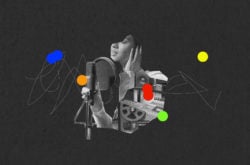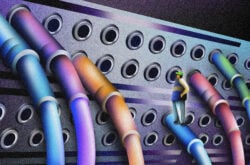A GRAMMY Award-winner and eight-time nominee, Emily Lazar is one of the most respected mastering and mixing engineers in the world.
Combining old-school sensibilities with a deep knowledge of music and cutting-edge technology, Lazar has mastered over 4,000 albums for an incredibly diverse group of artists ranging from The Beatles to Wu Tang Clan (and virtually everyone in between), breaking countless barriers along the way. She’s also the founder of We Are Moving the Needle, a non-profit organization that aims to close the vast gender gap in the technical fields in the recording industry.
Below, we had the unique opportunity to sit down with Lazar to discuss the mission and impact of We Are Moving The Needle, the importance of mentorship in music, and more.
To start, can you share We Are Moving The Needle’s mission for those who might be hearing about the organization for the first time?
We Are Moving The Needle works to close the gender gap and bring equity and inclusion to the present recording industry, as well as guarantee growth and progress for the generations to come by providing applicants with access to scholarships and grants to music technology and recording programs, educational programming, donated recording equipment (including software, hardware, and other technologies), support from our mentorship program with access to the members of our ‘SoundBoard,’ dedicated internships, and entry-level positions designated and reserved for our award recipients and applicants.
What were the beginnings of We Are Moving The Needle? How did you transform the idea into a reality, and who were some of your earliest community members, supporters, and SoundBoard and advisory board members?
This issue has been pervasive throughout my career, but when the USC Annenberg Inclusion Initiative study on inclusion in the recording studio found that only 2% of the producers and audio engineers were women in 2020, I knew I had to do something. I thought about each of the areas in which we could make a meaningful impact on the lives of aspiring producers and recording engineers. I was shocked and horrified to learn that the dismal 2% number had actually decreased a bit—and this was in the time just following the MeToo movement! It meant that whatever the music community was currently doing was clearly not working.
I came up with the idea to focus our efforts on four areas to create quantifiable change: education, equipment, energizing our community (through mentorships with current working professionals), and equalizing the landscape for employment opportunities. Once the framework was established, I reached out to colleagues to join WAMTN. The response was overwhelmingly positive, with forward-facing people like Brandi Carlile, HAIM, Maggie Rogers, and Linda Perry pledging to do whatever we needed right out of the gate. We launched on International Women’s Day in 2021.
Are there any opportunities you all have designed or stories of individuals We Are Moving The Needle has impacted that you’re particularly proud of?
This year, on International Women’s Day, we announced FIX THE MIX, an initiative in partnership with other like-minded organizations—Women in Music, SoundGirls, shesaid.so, Change the Conversation, Gender Amplified, and Femme House—along with music credits database Jaxsta in order to streamline the process of finding and connecting with recording industry professionals who identify as she/her and they/them.
Jaxsta is now the first music industry credits database of its kind with gender identifiers, through which the industry will be able to filter, search, and connect with engineers, producers, mixers, and songwriters who are women or non-binary. It was a simple idea, but no one was doing it before we brought this to Jaxsta. I frequently get asked to refer female producers, mixers, and engineers for records, but up until now there was no easy way to source women and non-binary talent, right there alongside their male counterparts linked to all of their credits in one place. It really is a game-changer.
How can the creators in our audience become involved with the We Are Moving The Needle community?
On our website, we have options to apply for scholarships, donate, connect with other members of the community, volunteer, and more.
Are there any scholarship or career advancement opportunities you’re offering that music creators may be interested in at this time?
The Blackbird Academy Scholarship! The program offers 700+ hours in the classroom / recording lab and studios. Classes meet five days per week (30 – 40 hours). Half of the program is spent in the studio, where students are broken into groups of five to focus on pre-production, recording live musicians, overdubbing, and mixing. The other half of the program takes place in the classroom, which is also a working recording studio that features an API console, two isolation booths, patchbays, individual Pro Tools HD stations, and three 65″ flat-screen TVs.
The scholarship includes full tuition to The Blackbird Academy’s 24-week Studio Recording Program, plus a $10,000 stipend for use on housing and living expenses. The application is for admission to a 24-week program in Nashville, TN that starts on April 11, 2022.
As you mentioned earlier, only ~2% of producers and engineers across popular music are women. What do you believe are the systematic and societal factors that contribute to this drastically low number?
When it comes to making records, the majority of the decision makers are men. A huge part of our aim is to make them—the decision makers—aware that there are talented women and non-binary candidates to fulfill producing and engineering roles. Our FIX THE MIX initiative now makes it easier than ever for people to find those talented women to hire. In order to encourage more women to seek out these positions, we need to raise awareness that these jobs are even a possibility for women. If you can see it, you can be it.
Why are mentorship and accessibility to education crucial in respect to both artistry as well as career development?
There is no obvious ladder to climb to become a successful creator. Most every artist and creator’s story is a unique and wild combination of grit, talent, and luck. While education and apprenticeship are the necessary tools you need to chop the wood, mentorship and access are the flint that sparks the fire. We Are Moving The Needle provides all four of these components in a unique program that seeks solutions for women and non-binary creators at every point in their career.
How can the larger music production, audio engineering, and music technology communities help cultivate spaces that are more inclusive for all genders?
It’s really not that hard to be inclusive—it just takes a little extra effort to hold yourself accountable for the decisions that you make.
What are your thoughts on how we as an industry can pay it forward and shine the light on new and upcoming female and non-binary music creators?
I think corporations, but also artists, need to pay more attention to the women and non-binary creators coming up in the scene and use their power to amplify them. This could be through mentoring, or through taking a chance and creating with them. There needs to be an overall larger effort to create spaces for them.
Learn more about We Are Moving The Needle and other organizations, artists, and creators who are creating a permanent, prevalent place for non-male creators in the industry:
March 17, 2022



